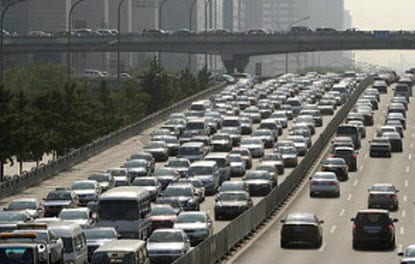
China aims to promote alternative energy transportation through new plan
July 31, 2012Fuel efficiency and emissions a serious concern for China
As one of the largest automotive markets in the world, China takes the matter of fuel efficiency standards quite seriously. When the country last hosted the Olympic Games, the government imposed strict emissions standards that were coupled with severe consequences. Though this initiative was primarily to ensure the health and performance of the athletes competing in the event, the country nonetheless saw the economic potential of such actions. This experience is now being applied to the realm of fuel efficiency.
Final version of ambitious plan released by Chinese government
China’s State Council has released the final version of its Energy-Saving and New-Energy Vehicles Industry Development Plan. The plan aims to expedite the country’s development of alternative energy transportation, with a keen focus on hydrogen fuel cells. Hydrogen has already been adopted by most of the world’s major automakers. These companies believe that the fuel is an adequate replacement for traditional gasoline. Automakers have chosen to adopt hydrogen fuel because of the stringent emissions and fuel efficiency standards coming from countries like China.
Plan aims to promote alternative energy vehicles as well as hybrids
Through the plan, China will seek to produce 500,000 electric vehicles powered by fuel cells or batteries by 2015. This will spike to 5 million by 2020, with 2 million electric vehicles being manufactured annually by that time. The plan was originally only meant to promote alternative energy vehicles. The latest version of the plan, however, includes the promotion of hybrid vehicles that make use of fuel cell and battery technology along with traditional forms of power.
Alternative energy initiative not backed by severe consequences for failure
The changes made to the plan are the latest of a series that have occurred since 2009, when the plan was first introduced. There are no implications that the plan will undergo further changes for the remainder of this year or in the future. Unlike previous initiatives enacted by the Chinese government that have been unsuccessful, the Energy-Saving and New-Energy Vehicles Industry Development Plan does not include severe penalties for automakers that do not live up to the country’s standards.
Related article(s) and resources:
http://www.chinadaily.com.cn/cndy/2012-07/30/content_15628934.htm



 With over 15 years of reporting hydrogen news, we are your premier source for the latest updates and insights in hydrogen and renewable energy.
With over 15 years of reporting hydrogen news, we are your premier source for the latest updates and insights in hydrogen and renewable energy.